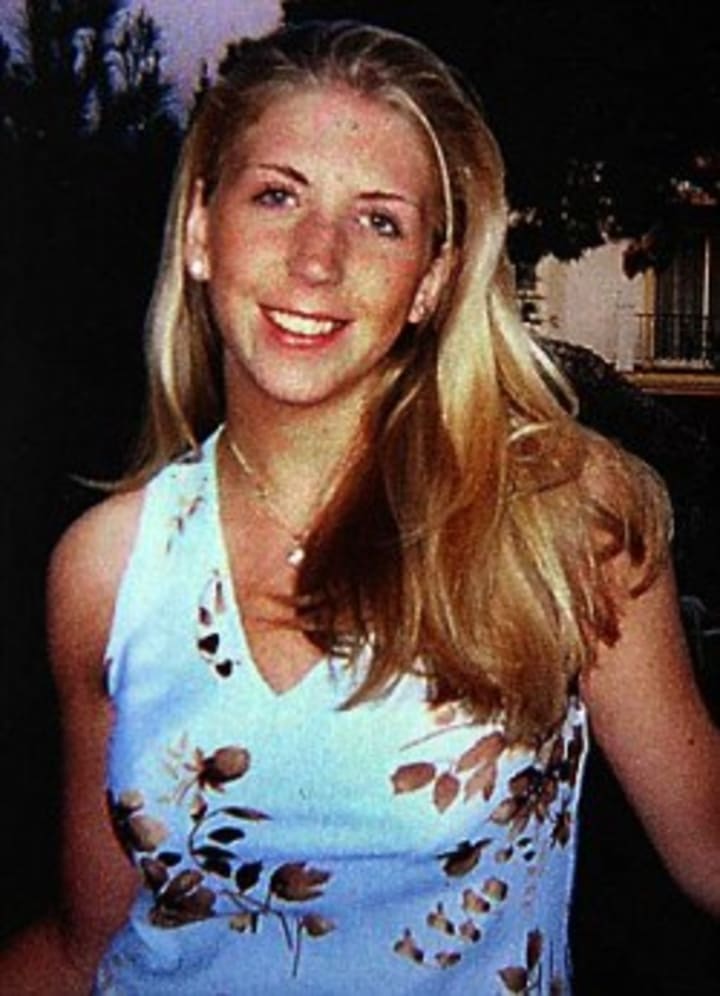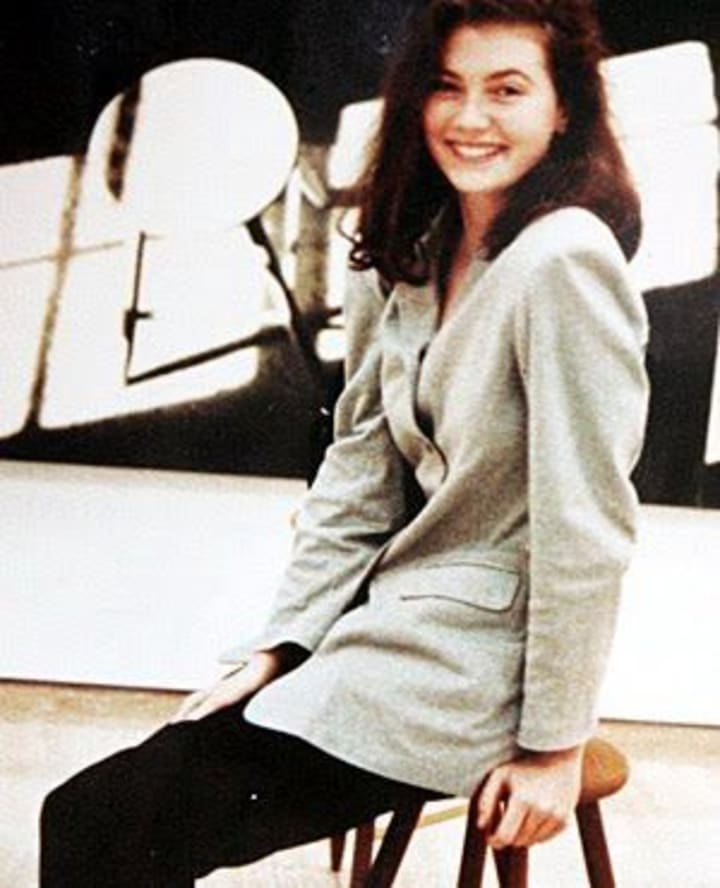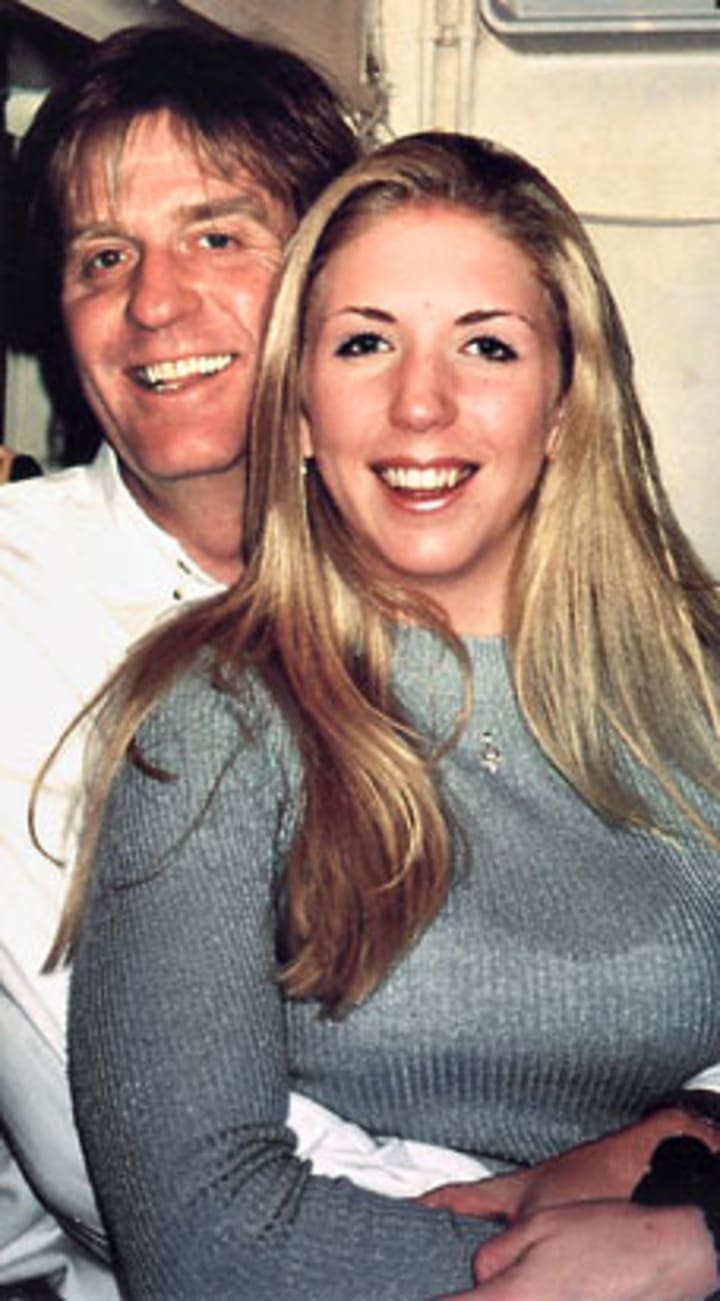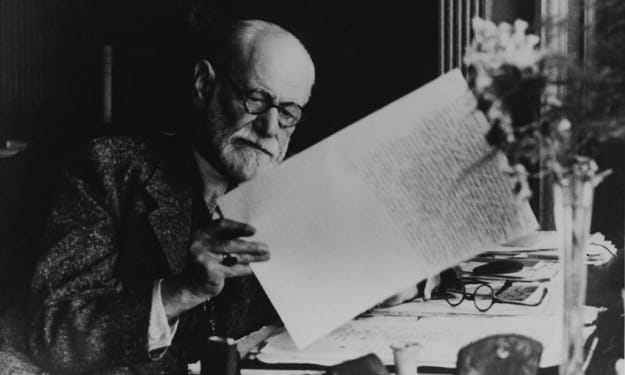Last Sunrise in Tokyo
The Lucie Blackman Case

Tokyo was a wonderland teeming with neon lights, shining adamantine towers, and the promise of unfamiliar excitement and opportunities. This held even more true for a young foreign woman being away from home for the first time in her twenty-one years. Lucie Blackman stepped foot in Tokyo in May of 2000 resolute on taking full advantage of the experience. She was memorized by the city and enthusiastic about obtaining a well-paying job, paying off her debts, and making her dreams come true. All of those aspirations drifted away into the humid light polluted skies when she one day ventured out in high spirits and was consumed by the vilest evil.
Lucie Blackman was a British female who seemed to have the average life. She grew up in Britain with her father Tim, mother Jane, and younger siblings Sophie and Rupert. Her parents divorced when she was young, she bounced between a few jobs, and ended up in a stable position as an airline stewardess for British Airways. Having dealt with various health problems as a child, working the long and trying shifts caused Lucie’s health to revert. Spending her every free moment away from work bedridden, she was eventually forced to quit and reexamine her life.

When Lucie’s best friend since childhood, Louise Phillips suggested that they go to Tokyo to experience a new culture and make quick money, it was a difficult idea to discount. Louise’s older sister Emma had recently gone to Tokyo herself, obtaining a job as a club hostess where she had made a vast amount of money in little time. Emma quickly got in touch with one of her contacts who was willing to help Louise and Lucie get started. Although friends and family of Lucie say she was reluctant about going, Lucie was dedicated to paying off her debts and being self-sustaining. Accordingly, while going to Tokyo to be a hostess certainly wasn’t her favorite idea, it made the most sense to her at the time.
Entry from Lucie’s Diary - Her First Day in Tokyo
“I am sitting on a suitcase at the railway underground feeling completely overwhelmed. I am very tired… also afraid, anxious… I only hope that I will look back on this with hindsight and laugh at my innocence - how I was so unaware of what was in store for me… I’ve bought my first thing – a bottle of tap water top to toe in Japanese writing… I sit here and there is a warm breeze coming from somewhere & it is gently blowing on my face. I look up and pray it is the wind of change which is going to make all my dreams come true.”
When Lucie and Louise arrived in Tokyo they met with Emma’s contact Christi, who provided them with a room in the neighborhood most known for foreign western woman, the Roppongi district. They landed jobs in the second club they solicited, a busy joint named ‘Casablanca’ and quickly began working. Being a hostess in Japan is vastly different from what it comprises in the western world. These clubs are most frequented by rich businessmen who often pay over $1000 an hour to have the company of beautiful women. The job of the hostess was to sit there, smile, light his cigars, attempt to have a lively conservation, and refill their drinks; most often a blend of water and whiskey known as mizuwari.
Dohans of a certain number per month were also required of the hostesses or they would lose their employment. A dohan is when a hostess meets with a client for lunch or dinner outside of the club, usually bringing him back to the club afterwards, so the establishment can reap even more money. Most dohans were rudimentary, where they sit and talk, the man often trying to show off, tell his life story, or wallow in depression, while the hostess must maintain a friendly and interested composure throughout. There was the rare case where the man would become crude and attempt to take things further, but it was overall common knowledge and proper etiquette that neither client nor hostess could engage in such behavior.
While Louise seemed to have the time of her life as a hostess, constantly being requested by men and never having to worry about losing her job, Lucie had the opposite experience. Her lack of dohans made her question her looks and feel inadequate, as well as add worry to her financial situation. She often wanted to go home but she didn’t want to leave her best friend and hadn’t yet paid off her debts, so she decided to stick it out. Eventually she ended up with a few regular clients, many with broken English with whom she couldn’t have a thorough conservation, but whom were courteous and agreeable.
One night when Louise and her were out after work, they ran into a military man from Texas named Scott. Lucie and him immediately hit it off, causing a whirlwind romance that flipped her world. Her diary entries swiftly changed from gloomy and self-loathing to ecstatic and fulfilled. She began blowing off her clients to instead spend time with Scott, causing her to miss out on several dohans. Being in hot water with her employer she jumped into a dohan with a new client who requested her to have lunch with him. The client seemed very nice and even told her he would buy her a much-needed mobile phone, which was unlawful for a foreigner to purchase in Japan in 2000.
The day of, her and Louise sat in the kitchen talking of their happiness, how much Tokyo was working out for them, and how they would have their debts paid off in no time. Lucie told Louise how Scott had just told her he loved her and how she was over the moon. She was going to meet up with Louise at a club later that night to celebrate, and had also planned a date with Scott for the next day. That Saturday afternoon she left with a grin on her face, and it was also the last time she was ever to be seen.
Louise asserted that she had received a phone call from Lucie midway through her dohan saying that she was going to be a little late as they were going to the seaside. She hadn’t thought anything of it as her and Lucie were constantly checking up on each other and her tone had seemed fine. Yet when Lucie didn’t show up later that night Louise knew something was wrong. She immediately became frantic, causing suspicion to arise from some. Not thirty minutes after Lucie was expected to be home, did she phone her own mother Maureen Phillips back in Britain. “Something has happened to Lucie” she told her. Afterwards she spent the night searching the Roppongi district despairingly hoping she’d run into Lucie, even though deep down she had the worst feeling.

The next morning, she contacted a Japanese man who had worked as a waiter at Casablanca and told him of the situation. He assisted her in calling some of the local hospitals, but they had no luck in their search for Lucie. Louise knew that the next step was to go to the police, but because her and Lucie had entered on ninety-day visas, they were expressly forbidden from any employment. This was the situation for most of the foreigners working in Roppongi, and although the law turned an eye most of the time, they unfortunately also turned an eye when crime was carried out on them.
After the police showed little interest in Louise’s story, she decided it was time to go to the British embassy. There she spoke to the vice-consul Iain Ferguson, who expressed bafflement at the scenario that Louise was putting forward. When he questioned Louise about the client Lucie had been meeting, any details she had mentioned about him, or any identifying characteristics at all, Louise purportedly knew nothing at all. Iain found this quite perplexing as he expected such close friends who supposedly shared everything with each other to have divulged a name, type of car, or some other information about the client they were meeting for lunch. Lucie’s family also found it difficult, knowing their talkative and sensible daughter was bound to have shared more about the new and wealthy customer who had promised her a mobile phone.
Monday, two days after Lucie’s disappearance, Louise received a mysterious phone call that she struggled to make sense of. It was a man with a distinct Japanese accent, but who spoke English seamlessly, identifying himself as Akira Tagagi. He asserted that Lucie was there with him. When Louise asked to speak with her, the man denied the request, stating that Lucie must not be disturbed. He went on to say that he was part of a cult and that Lucie had decided to join. He didn’t give many details aside from saying it was in Chiba and the “Newly Risen Religion”. He also told her that Lucie wanted her and S’kotto to know she was okay. He had distinctly said “S’kotto” the common Japanese rendering of the unfamiliar name Scott. He then went on to say she had written a letter to Casablanca putting in her resignation, and was now planning a better life, before he apologized and hung up the phone.
Everyone agreed it was completely out of Lucie’s character to not be somewhere when she had made a commitment or to at least find a way to let them know. Those that knew her described her as a, “worldly-wise, intelligent individual who had the experience and judgement not to have foolishly put herself in danger”. However, it took a great deal of persuasion to convince the Tokyo police of this, whom were adamant that western women were just wild and that she most likely went off on her own accord. On top of that she had been illegally working in the country so she was already seen as someone who disrespected their laws. They commonly dealt with foreign women who reported crimes of stalking, assault, or rape, and a common solution was just to have the women deported and wash their hands of the case.
One of Lucie’s frequent clients whom she had gone on a handful of dohans with, spoke out after her disappearance. “The club is far from the irresponsible reports by mass media aimed at vulgar gossips and based on groundless conjectures. The ladies’ job there is only lighting customer’s cigarette, making whiskey and water for him, singing karaoke together and keeping company in talking. That’s all, nothing else, just like she told her mother, ‘a kind of waitressing’. I’ve no mind to put in a good word for me. I dare want to say this fact for her honor!”
It wasn’t until the disappearance of Lucie Blackman, who came from an upper-middle class family that had money and resources to assist in the search for their daughter, that the Tokyo police were forced to take a deeper look at the travesties that were being committed right under their noses. On Monday night, Louise had finally worked up the nerve to call Lucie’s faback in Britain and tell them what had happened. Her sister Sophie and her father Tim arrived in Tokyo shortly thereafter, spending their time between the police, the British Embassy, and press conferences. They hung over 30,000 missing flyers with the picture of the amiable smiling blond British woman. Unfortunately, regardless of their efforts, it did not seem they were getting any closer to finding Lucie.

There were several women in Tokyo who immediately had a suspect in mind upon hearing of Lucie’s case. Numerous women recalled being attacked by a customer and subsequently ignored by the police. The circumstances all seemed familiar, where they were taken to the seaside in an expensive car, offered a fancy wine or beverage, and then woke up in excruciating pain, oftentimes partially clothed. One such case was of the young American woman, Katie Vickers. In 1997 she had been working at Club Cadeau. She went on a dohan with a well-dressed man who referred to himself as Koji. The last thing she remembered was taking one sip of a gin and tonic, before waking up fifteen hours later on a sofa in just her underwear.
After visiting a doctor, she went to police to report the crime and was disturbed by their response. She was not taken into a private room or asked to have a seat, they left her standing at the reception desk showing no interest her story. They jotted down some notes on a piece of paper but refused to make a formal report, stating there was not enough evidence. Yet Katie had a precise description of the man, a telephone number written by him, and could clearly describe the location. Instead of them working to investigate the situation they shewed Katie out as if she was just a bother and a waste of their time.
With Lucie’s disappearance reaching across the globe, Roppongi hostesses, both active and retired were soon coming forward in droves with similar stories. Most these women were foreign and had never previously gone to the police as they knew they would either be deported, not taken seriously, or made to feel humiliated. After becoming aware of Lucie’s case, they knew they couldn’t stay silent any longer. Peculiarly enough, one of these women was Christa, the roommate of Louise and Lucie.
Christa had gone to Tokyo in search of independence, but unfortunately became the victim of a horrendous crime. One night a newcomer walked into her work with an air of being well-established and a high-spender. He introduced himself as Yuji Honda and had an educated manner, but was also slightly arrogant and overly confident. Christa and Yuji spent hours together that first evening, Yuji promising he would come see her again. Their dohan relationship was quickly established, meeting for dinner every week, often eating fugu and shark fin soup.
In May of 1995, he picked her up after work to take her on a seaside drive and then dinner at his apartment. She remembers eating fugu and drinking beer, him playing electric guitar, and then when she wanted to leave, he insisted he had one more thing to show her. He pulled out a rare wine from the Philippines and handed a glass to Christa. The taste of her first sip of wine was the last thing she remembered. She woke up in darkness and knew immediately what had happened. She was angry and embarrassed but felt if she went to the police, they would say she was partially to blame for putting herself into such a situation. Therefore, she decided to keep it to herself; but why she hadn’t attempted to warn Lucie and Louise of such a predator prowling on foreign women when she was supposed to be the one getting them started on the right foot, still remains a mystery.
Meanwhile Lucie’s father was struggling in his dealings with the Japanese police and not knowing where his daughter was. They refused to examine the past claims of women as something that could be related to the case, perhaps because they did not want to admit that the same person had been committing such atrocities all these years and that they’d done nothing to stop it. Tim was flabbergasted and dejected that the police did not seem to be doing anything at all in regards to finding Lucie, and began to question their resolve.
Three years earlier, twenty-seven-year-old Canadian hostess Tiffany Fordham, disappeared after last seen leaving a bar; her case remained opened. Whilst Carita Ridgway, a twenty-one-year-old Australian who came to Tokyo in December of 2001 to teach English for a few months, was said to have died under mysterious circumstances. When she wasn’t able to get a teaching job right away, she decided to try her hand at working at a hostess bar. She spent around two months dressing nicely, pouring drinks, and having friendly conversations before going on a group dohan with a client. That night she never returned home.

Her sister came home to find a strange message saying that Carita was going away with friends for the weekend. She found it highly unusual that Carita hadn’t left the message herself, and that the caller didn’t identify himself. Samantha became extremely worried after her sister still did not return when the weekend ended. She then received an upsetting night call from a hospital in Kichijoji Tokyo stating that Carita had been admitted for severe food poisoning. Once at the hospital she was informed that a man by the name of Akira Nishida had dropped Carita off, stating she had eaten some shellfish and gotten ill.
The doctors diagnosed that Carita must have hepatitis D or E but were clueless as to what could have caused it. A couple days later, still unconscious, Carita fell into a coma due to severe liver failure and organ damage. She was pronounced brain dead, her family then making the decision to take her off life support. There was never an autopsy done, and she was cremated as is customary in Japan.
During her time in the hospital, Nishida had called Samantha several times in an attempt to find out Carita’s condition and reinforce the fact that she had gotten food poisoning. After Carita’s death Samantha went to the police several times and begged them to investigate the mystery caller, but the police refused and became agitated. Nine years would pass where the assailant would enjoy life as usual, living as a millionaire and bringing girls to his apartment to drug and then rape repeatedly for hours while they were unconscious, until the Lucie Blackman case would shine light on the horrible monster that had been using Tokyo as his hunting grounds.
Lucie’s father now at a point of desperation received a phone call from a man named Mike Hills. He said he had inside men that knew information about Lucie and could get her back. He seemed to be a genuine and honest man that just wanted to help, and although he asked to be paid $50,000 to be able to execute the operation, Tim decided it was worth the risk. Being at wits end with the police who did not seem willing to do anything, the media who only cared about an attention-grabbing story, and an endless number of tips coming in that led to nowhere, he could not pass up any chance to get back his daughter, even if it did end up being a scam.
Mike Hills strung Tim along with supposed inside information, having eyes on Lucie, his men on her trail, returning her home immediately, and so forth and so on. Frequently asking for more money as the situation had become complicated. After a certain amount of time, Tim’s hope was eventually overshadowed by doubt and mistrust. Sure enough, Mike did turn out to just be a scam artist who knew nothing of Lucie’s whereabouts, but instead saw her situation as a money-making opportunity. Back in Britain, her mother Jane was also forlorn by the progress in the case, turning to psychics, fortunetellers, and the like.

The police had barely set up their investigation headquarters for Lucie’s case by mid-July. They quickly thereafter received a printed letter made to look as if it was from Lucie, with the signature coming across as remarkably precise. The letter alluded to such things as Louise destroying her plans by making her famous, that she wanted to escape, and that “you think you know me but you don’t”. The police still believed the possibility that Lucie had run off on her own and perhaps did join a religious cult, despite her friends and family saying that the letter was definitely not written by her.
Tim continued to clash with the police, one night hanging up missing posters of Lucie in Roppongi when a policeman told him that it was not allowed and to stop immediately. After he walked off Tim walked to the next telephone pole that had been plastered with photographs and advertisements bearing semi naked women. He held up the flyers in complete bafflement. “But these are alright?”
Tim had been imploring for months that police investigate the most promising lead they had so far, the shadowy phone call that Louise had received two days after Lucie’s disappearance. He clearly had information in regards to Lucie’s disappearance and may even still be holding her. The police continued to say it was a difficult process to investigate phone records and that they would need to go through the courts, and required time before proceeding. By the time September had come, the hysteria around the case had died down, the media no longer held much interest, and the police were still dragging their feet. Patience from the Blackman family as well as the British embassy had run dry.
Determined to do anything to find his daughter, Tim blazed a trail few could have accomplished. He was able to communicate with Prime Minister Tony Blair, who in turn brought up the case to the Japanese prime minister. He also raised enough attention to have the lord chancellor Derry Irvine do the same upon his visit to Tokyo, who asked if the justice minister could assist with tracing the telephone records. Prime Minister Tony Blair brought up the case a second time after a significant period of time had passed with no results; asking for the special cooperation of the Japanese police. This made them feel as if a fire had been lit under them, seeing their cooperation as a gesture of goodwill towards Britain, as well necessary in maintaining the dignity of the Japanese police.

By late September, three months after Lucie’s disappearance they were finally tracking down phone records. Both Christa and Katie had gone to the police upon hearing of Lucie’s case and told them their individual stories, Katie for the second time. At this point they decided that they may indeed be linked to the Lucie case and began to investigate the claims. Taking the phone numbers they had been given, they began a thorough investigation. Each number had been registered under a different name and had been charged with prepaid vouchers.
Eventually they found that one of the numbers belonged to a batch of seventy cellphones purchased at in electronics shop in Tokyo by a single customer. They had given a false name, making the purchase just days before a new law went into effect requiring that purchasers of such phones show proof of address and identity. So far, only ten of the phones out of the batch had been activated. There were able to isolate the mobile in which Lucie had made her last call to Louise and pinpoint the relay station that had transmitted it. It was in the town of Zushi, where Katie, Christa, and various other women asserted as the place where they had been drugged and brutalized.
By the end of September, the police were confident that they’d found the culprit. The detectives rendezvoused with a nearby police station which provided them with a bizarre story. On July 6th, five days after Lucie’s disappearance, three officers had gone to the Blue Sea Aburatsubo after receiving a complaint from the caretaker. They were told that a man driving a sports car whom had a lumpy object covered in white sheets on the passenger side, entered an apartment that hadn’t been used in years. When they knocked on the door they saw concrete pieces scattered around and some kind of linen bag in the back room.
They were faced with a man in pajama trousers, trembling and sweating profusely. When they asked if they could come inside and examine the room, the man refused, insisting he was doing nothing more than retiling the bathroom. Lacking a warrant or evidence of a serious crime, the police were unable to enter or carry out a search. Calling it into the station they confirmed that the man was indeed the owner of the property. Strangely enough a little while later the man called them back to the apartment and showed them a dead dog cradled in paper, insisting that his dog died and he hadn’t wanted the police to think it strange. When they received reports just a few days later that a foreign woman had gone missing after being driven to the sea, they somehow didn’t make any connection.
It wasn’t until October 11th, five months after Lucie disappeared that they were finally able to make an arrest. They had discovered the culprit to be Joji Obara, a man of Korean descent who had originally gone by the name Kim Sung Jong. He had acquired his wealth from his father and had lived a comfortable lifestyle, constantly traveling, and becoming fluent in English. Joji was very secretive, rarely appearing on camera and living a very dark and devious life that he was able to keep hidden for decades. Tracking down Joji Obara at one of his properties, they arrested him leaving a convenience store on the corner, clutching a bundle of newspapers. When the arresting officers addressed him, he began to tremble and beads of sweat streaked down his face.

Police say when they raided his apartment, they quickly found mountains of incriminating evidence. They recovered hundreds of videotapes depicting at least 400 rapes in which Joji is shown wearing nothing but a Zorro mask where he repeatedly rapes and inserts numerous foreign objects into women who are unconscious or semi-conscious. Some of these videos lasted over twelve hours long, where he would repeatedly use chloroform on the women as they began to regain consciousness. Along with the videos was a journal going into great detail of his activities and thoughts, containing such description as,
“My goal is to have sex with over 500 people by the age of 50”.
“Women are only good for sex”.
“I can’t do women who are conscious”.
“Foreign hostesses are all ugly. Not in the sense of appearance, but in their minds”.
They quickly found evidence that he was indeed Carita’s killer, finding video of him raping her while unconscious, repeatedly covering her mouth with a chloroform-soaked towel, and a hospital receipt for the day he dropped her off. The journal entry in regards to her read, “Carita Ridgeway, too much chloroform”. Although the tapes contained over 150 western women being raped by Joji, they couldn’t find one with Lucie.
It wasn’t until Febuary 9th, 2001 when conducting a search in a seaside cave just about a mile from Joji’s residence, did they uncover Lucie’s body. She had been discarded in a shallow grave and then covered by a bathtub. The body had been cut into eight different pieces and shoved into garbage bags, her head had been shaved and encased into concrete. The body was so badly decomposed that they were unable to ascertain the cause of death or be able to test her for toxins. They did however find receipts for a chainsaw and shovel, most likely purchased in order to dispose of Lucie.
The trial lasted six years where they struggled to convict Joji of Lucie’s murder despite all of the evidence. In April, 2007, the judge cited that despite it being clear that Joji was with Lucie before she vanished, it was not enough to secure a conviction. Therefore, while found guilty of the rapes of several other women as well as the manslaughter of Carita, he was acquitted for the rape and murder of Lucie as it could not be proven that he committed those acts. In December of 2008 the public prosecutor appealed the decision stating that they had “crucial forensic evidence not heard at the original trial”. The Tokyo High Court ended up finding Joji guilty on all counts of abduction, dismemberment, and disposal of Lucie Blackman. Joji tried to appeal, but the Supreme Court of Japan rejected it and upheld his life sentence.
Despite Joji getting a life sentence, justice will never be upheld for all of the lives he destroyed. For the hundreds of women who were victimized and for the two who lost their lives, the pain and anguish will never truly cease. No amount of rain can wash away the horrors that one creature was able to inflict upon those who came to Tokyo with enthusiasm, aspirations, and smiling faces, but were encountered with a grotesquery that can never be adequately described in words.
To this day Lucie’s family doesn’t know the exact cause of her death, so many possibilities and questions, but no answers can bring clarity or satisfaction. Could Lucie have refused the drink and attempted to get away? Did she attempt to fight back against her assailant? Did she come to while he was assaulting her? It seems no one will ever know for sure. Many have heard Lucie’s story, followed the case, saw some information here or there, and then quickly forgot about her. Yet, news clips, newspaper articles, or even a thousand-page novel can never accurately portray a human being.
At the age of twenty-one Lucie had a very eccentric personality; changing and intricate, too much so for even those closest to her to understand. Just as all of our lives, hers was one filled with various hobbies and habits, grievances, aspirations, self-doubt, confidence, susceptibility, and strength. She was consumed by an evil too ghastly for some to imagine, her life ripped away from her in a flash of horror.

Tomorrow the sun will rise in Tokyo, eight hours later it will rise Britain, but Lucie Blackman will never see a sunrise again.
About the Creator
M.R. Cameo
M.R. Cameo generally writes horror, sci-fi, fantasy, and nonfiction, yet enjoys dabbling in different genres. She is currently doing freelance work for various publications.






Comments
There are no comments for this story
Be the first to respond and start the conversation.